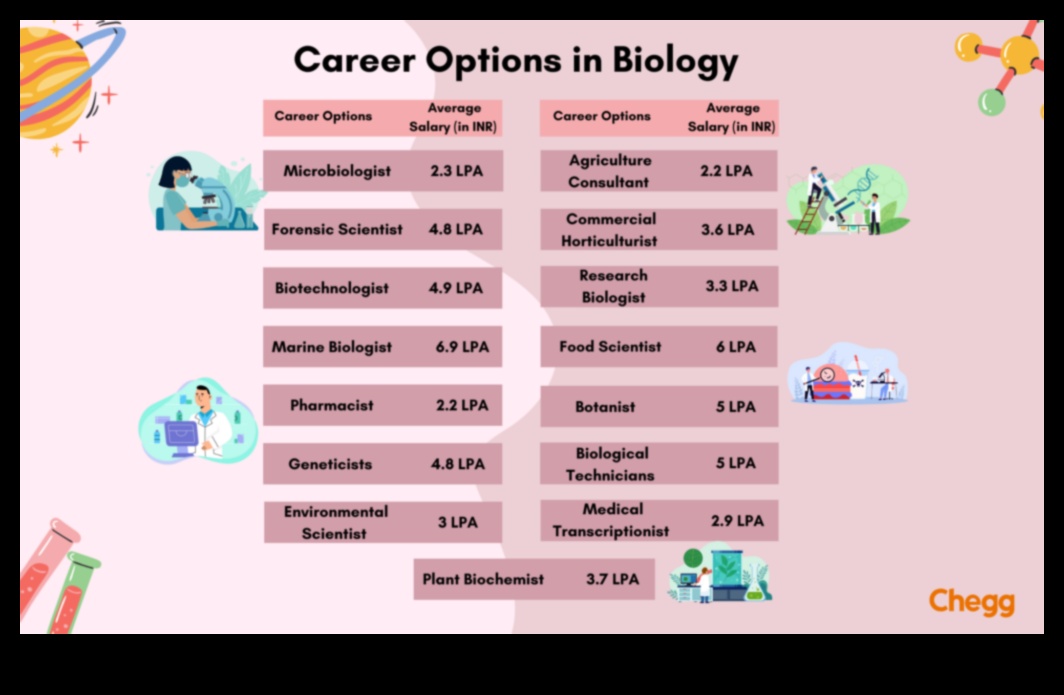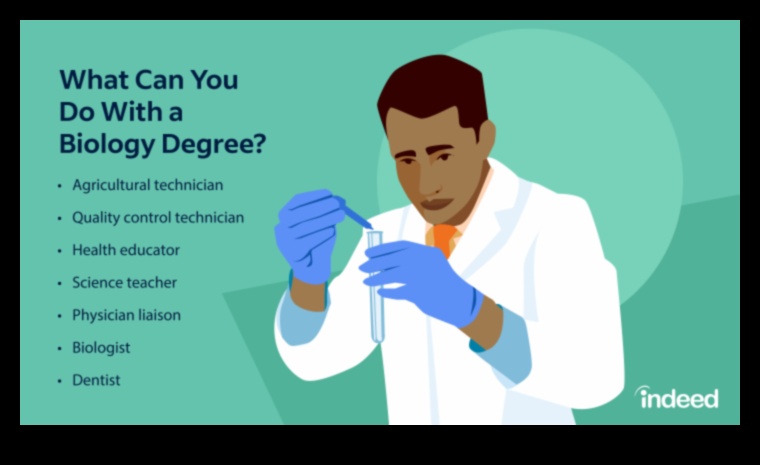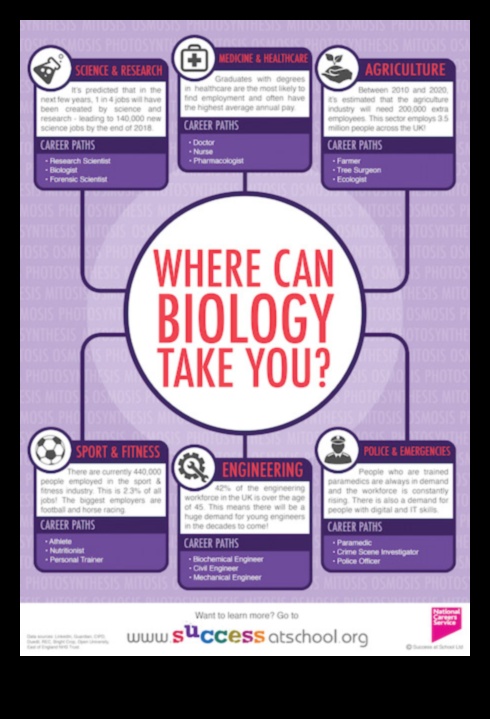
What Jobs Can You Get With a Bachelor’s in Biology?
A bachelor’s degree in biology can lead to a variety of careers in the healthcare, research, and environmental fields. Here is a list of some of the most common biology jobs:
- Biomedical Scientist
- Environmental Scientist
- Forensic Scientist
- Geneticist
- Lab Technician
- Medical Scientist
- Pharmaceutical Scientist
- Research Assistant
- Science Educator
The salary potential for biology jobs varies depending on the specific job title, the level of experience, and the geographic location. However, according to the Bureau of Labor Statistics, the median annual salary for all biology-related occupations is $67,170.
The job outlook for biology jobs is also positive. The BLS projects that employment in biology-related occupations will grow by 7% from 2020 to 2030, faster than the average for all occupations.
If you are interested in a career in biology, there are a few things you can do to prepare yourself. First, make sure to get a strong foundation in biology by taking courses in cell biology, genetics, molecular biology, and ecology. You should also gain experience in the laboratory by volunteering or working as a research assistant. Finally, consider pursuing a master’s or doctoral degree in biology if you want to qualify for the most high-paying jobs.
With a bachelor’s degree in biology, you can have a rewarding career in a variety of fields. By following these tips, you can increase your chances of success in your chosen field.
| OUTLINE | LSI Keywords |
|---|---|
| I. Introduction | biology careers, biology jobs, biology degree, biology salary, biology major |
| II. Types of Biology Jobs | biology careers, biology jobs, biology degree, biology salary, biology major |
| III. Education and Training Requirements | biology careers, biology jobs, biology degree, biology salary, biology major |
| IV. Salary and Benefits | biology careers, biology jobs, biology degree, biology salary, biology major |
| V. Job Outlook | biology careers, biology jobs, biology degree, biology salary, biology major |

II. Types of Biology Jobs
There are a wide variety of biology jobs available, from research positions in academia and industry to clinical and laboratory positions in healthcare. Some of the most common types of biology jobs include:
- Research Scientist
- Lab Technician
- Medical Scientist
- Environmental Scientist
- Forensic Scientist
- Bioinformatician
- Science Educator
- Science Writer
- Science Policy Analyst
The specific duties and responsibilities of these jobs will vary depending on the employer and the industry, but some common tasks include conducting research, analyzing data, developing and implementing experiments, and communicating scientific findings to the public.
To learn more about the different types of biology jobs available, you can visit the following websites:
II. Types of Biology Jobs
There are a wide variety of biology jobs available, from research and development to teaching and healthcare. Some of the most common biology jobs include:
* Research Scientist: Research scientists conduct experiments and analyze data to develop new knowledge about the natural world. They work in a variety of settings, including universities, government agencies, and private industry.
* Medical Scientist: Medical scientists apply biological principles to develop new treatments and therapies for diseases. They work in hospitals, clinics, and pharmaceutical companies.
* Environmental Scientist: Environmental scientists study the impact of human activities on the environment. They work to develop ways to protect the environment and promote sustainability.
* Forensic Scientist: Forensic scientists use their knowledge of biology to help solve crimes. They work in law enforcement agencies and crime laboratories.
* Teacher: Biology teachers teach students about the natural world. They work in elementary schools, middle schools, and high schools.
These are just a few of the many biology jobs that are available. With a bachelor’s degree in biology, you can find a career that is both challenging and rewarding.

IV. Salary and Benefits
The median annual salary for biologists was $67,170 in 2020. The top 10% of earners made more than $112,890, while the bottom 10% made less than $41,210.
Salary varies depending on the type of job, level of experience, and geographic location. Biologists who work in research and development typically earn more than those who work in education or government. Biologists who live in large cities or in high-cost areas also tend to earn more than those who live in rural areas or in low-cost areas.
Biologists typically receive a variety of benefits, including health insurance, retirement plans, and paid time off. The specific benefits offered vary from employer to employer.

V. Job Outlook
The job outlook for biology majors is expected to be strong in the coming years. According to the Bureau of Labor Statistics, the employment of biologists is projected to grow by 6% from 2020 to 2030, faster than the average for all occupations. This growth is expected to be driven by the increasing demand for biological scientists in a variety of fields, such as healthcare, agriculture, and environmental science.
Biologists with a bachelor’s degree can find jobs in a variety of settings, including:
- Government agencies
- Research and development laboratories
- Educational institutions
- Healthcare organizations
- Environmental consulting firms
The median annual salary for biologists was $82,660 in 2020. However, salaries vary depending on the industry, the employer, and the level of experience.
Biologists who have a master’s degree or doctorate can find jobs in more specialized roles, such as research scientist, professor, or medical scientist. They may also earn higher salaries than those with a bachelor’s degree.

VI. How to Get a Biology Job
There are a few things you can do to increase your chances of getting a biology job.
First, make sure you have a strong academic record. This means getting good grades in your biology courses, as well as in other related courses such as chemistry, math, and physics. You should also consider doing some research or internships in your field of interest.
Second, network with people in your field. Attend industry events, join professional organizations, and connect with people on LinkedIn. This will help you get your foot in the door and learn about job openings that might not be advertised publicly.
Third, tailor your resume and cover letter to each job you apply for. Make sure to highlight your skills and experience that are relevant to the position you’re applying for.
Fourth, practice your interview skills. This includes preparing answers to common interview questions, dressing professionally, and being confident and articulate during the interview.
Finally, don’t give up. The job search process can be long and challenging, but it’s important to stay positive and persistent. Eventually, you’ll find a job that’s a good fit for you.
VII. Networking and Interviewing
Networking is essential for any job seeker, but it is especially important for those who are looking for a biology job. This is because the field of biology is so competitive, and it can be difficult to get your foot in the door without knowing someone who can help you.
There are a number of ways to network in the field of biology. You can attend industry events, join professional organizations, and connect with people on social media. When you meet new people, be sure to introduce yourself and let them know what you are looking for. You can also ask them for advice on how to get started in your career.
Interviewing is another important part of the job search process. When you are interviewing for a biology job, it is important to be prepared. This means doing your research on the company and the position, and practicing your answers to common interview questions. You should also dress professionally and arrive on time for your interview.
If you are successful in getting an interview, be sure to thank the interviewer for their time. You can also follow up with them after the interview to let them know that you are still interested in the position.
Finding a Mentor
Finding a mentor can be a valuable way to learn from someone who has more experience in your field. A mentor can provide guidance, support, and advice, and can help you to develop your skills and knowledge.
There are a few different ways to find a mentor. You can ask your professors, classmates, or other professionals in your field for recommendations. You can also look for mentors online or through professional organizations.
Once you have found a potential mentor, it is important to reach out and introduce yourself. Explain why you are interested in mentorship and what you hope to gain from the relationship. If the mentor is interested, you can set up a time to meet and discuss your goals.
A mentorship relationship can be a valuable asset to your career. A mentor can help you to develop your skills, learn from their experience, and achieve your goals. If you are looking for a way to advance your career, consider finding a mentor.
IX. Starting Your Own Business
Starting your own business is a great way to use your biology degree to make a difference in the world. There are many different types of businesses that you can start with a biology degree, including:
Consulting firm: You can use your expertise in biology to help businesses solve problems related to their products or services.
Research lab: You can start your own research lab to conduct research on new drugs, treatments, or technologies.
Biotech company: You can start your own biotech company to develop new products or technologies based on your research.
Environmental consulting firm: You can use your knowledge of biology to help businesses and individuals reduce their environmental impact.
Educational institution: You can start your own educational institution to teach others about biology.
Starting your own business can be a challenging but rewarding experience. It is important to have a strong business plan and to be prepared for the challenges that you will face. However, if you are successful, you can make a real difference in the world and create a lasting legacy.
X. FAQ
Q: What are the different types of biology jobs?
A: There are a wide variety of biology jobs available, including:
- Research scientist
- Environmental scientist
- Medical technologist
- Teacher
- Pharmaceutical sales representative
Q: What are the education and training requirements for biology jobs?
A: Most biology jobs require a bachelor’s degree in biology or a related field. Some jobs may require a master’s degree or a Ph.D.
Q: What is the salary potential for biology jobs?
The salary potential for biology jobs varies depending on the type of job, the level of education, and the experience of the individual. The median annual salary for biologists is $67,000.